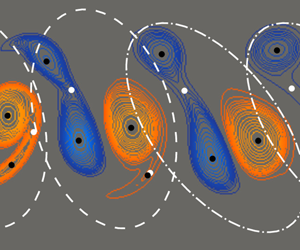Article contents
Topological bifurcations in the transition from two single vortices to a pair and a single vortex in the periodic wake behind an oscillating cylinder
Published online by Cambridge University Press: 08 April 2022
Abstract

We explore the two-dimensional flow past a cylinder undergoing forced transversal oscillations with the aim of elucidating the evolution of the topology of the wake under variation of the forcing amplitude at a Reynolds number of 100. In particular, we study the change from two single vortices (2S mode) to a pair and a single vortex ( $\text {P}+ \text {S}$ mode) being shed per period. Matharu et al. (J. Fluid Mech., vol. 918, 2021, p. A21) showed that a dynamical symmetry-breaking pitchfork bifurcation plays a key role in this transition. We show that in addition to this bifurcation, a number of topological bifurcations in the vorticity field occur, both on the symmetric 2S branch and on the asymmetric
$\text {P}+ \text {S}$ mode) being shed per period. Matharu et al. (J. Fluid Mech., vol. 918, 2021, p. A21) showed that a dynamical symmetry-breaking pitchfork bifurcation plays a key role in this transition. We show that in addition to this bifurcation, a number of topological bifurcations in the vorticity field occur, both on the symmetric 2S branch and on the asymmetric  $\text {P}+ \text {S}$ branch. The topological bifurcations are cusp bifurcations where an extremum of vorticity is created or destroyed. To describe the effect of the topological bifurcations we introduce an extended symbolic classification of the wake modes to account for the spatial variations of the vortex patterns that occur in the transition process. We identify four amplitude values that define critical stages in the transition, and provide a complete qualitative picture of the transition from 2S to
$\text {P}+ \text {S}$ branch. The topological bifurcations are cusp bifurcations where an extremum of vorticity is created or destroyed. To describe the effect of the topological bifurcations we introduce an extended symbolic classification of the wake modes to account for the spatial variations of the vortex patterns that occur in the transition process. We identify four amplitude values that define critical stages in the transition, and provide a complete qualitative picture of the transition from 2S to  $\text {P}+ \text {S}$ mode. We confirm the robustness of the observed transition process by simulations at Reynolds number 80.
$\text {P}+ \text {S}$ mode. We confirm the robustness of the observed transition process by simulations at Reynolds number 80.
- Type
- JFM Papers
- Information
- Copyright
- © The Author(s), 2022. Published by Cambridge University Press
References
REFERENCES
- 1
- Cited by



